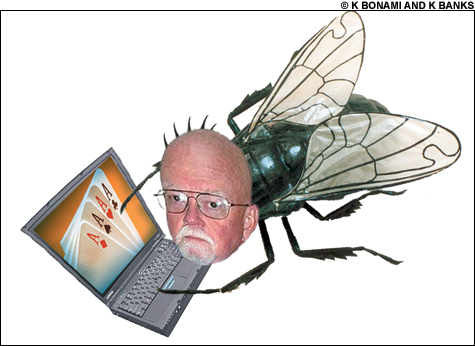
FLY OFF THE HANDLE: Peter Kenney’s scoops jeopardized the future of casino gambling in Massachusetts.
|
The biggest political story in Massachusetts right now is the state’s ongoing dalliance with casino gambling — but the biggest scoops haven’t been coming from the Globe or the Herald. Their source, instead, has been Yarmouth resident Peter Kenney, a/k/a the “Great Gadfly,” a sexagenarian carpenter and public-access-cable star who writes for CapeCodToday.com.

On August 20, Kenney blogged that Glenn Marshall — the leader of the Mashpee Wampanoag tribe, which received federal tribal recognition in February and struck a casino deal with the town of Middleborough in July — had lied about his military record. Marshall previously claimed he’d received a Silver Star for service in Vietnam; in fact, Kenney noted, Marshall’s name wasn’t listed on a Web site that tracks Silver Star recipients. Two days later, in an addendum to his original post, Kenney reported that Marshall’s three Purple Hearts were fabrications, too. Then, on August 23, Kenney produced his most damning piece yet — revealing, among other things, that Marshall had been convicted of rape in 1981.
These exclusives have already thrown the Mashpee Wampanoags into disarray. Marshall stepped down as the tribe’s chairman on August 24, the same day that the Cape Cod Times reported on his rape conviction and sundry fabrications; he also copped to additional transgressions, including an arrest for cocaine possession. Now, two long-time Marshall opponents — the mother-son team of Amelia and Steven Bingham — are vying with Shawn Hendricks, Marshall’s successor and ally, for tribal control. But the implications of Kenney’s reportage are much, much bigger. Without Marshall calling the shots, the tribe might try to build a casino on the Cape instead of in Middleborough — or (Kenney’s personal preference) decide not to build one at all. What’s more, Governor Deval Patrick is still weighing whether or not to support casino gambling. Marshall’s implosion and the chaos it created could help convince the governor to take a pass.
Kenney is still on the story, and he’s still breaking news. (On September 5, he was the first to report a meeting between the Binghams, scandal-prone State Senator Dianne Wilkerson, and Patrick aide Michael Morris; the next day, Joan Vennochi, the Globe’s influential op-ed columnist, cited this meeting in a column urging the governor to say no to gambling.) He’s also becoming something of a Boston media celebrity: he discussed the casino wars with Emily Rooney on WGBH-TV’s GreaterBoston this past week, and is slated to appear with Jim Braude on NECN’s NewsNight in the near future. But if Kenney’s rise is a heartwarming tribute to the power of citizen journalism, it also raises some perplexing questions. For one: is Kenney a journalist or a combatant? And if the answer isn’t clear, should the Massachusetts media really be following his lead?
Talk show
This past week, I visited Kenney in Yarmouth’s Cape Cod Community Media Center, which broadcasts his Great Gadfly program. It was an unusually enjoyable interview. Kenney’s sense of humor is appealingly droll, and he follows his jokes with loud guffaws that amplify their effect. He’s also a born storyteller, with a knack for cadence and rhythm and an ear for the dramatic pause. In Kenney’s hands, mundane subjects acquire the dramatic sheen of a campfire ghost story.
Of course, yarn-spinners also tend to be show-offs, and Kenney is no exception. After explaining that he attended Boston Latin School but graduated from the Newman School for Boys, for example, Kenney said that he got 800s on his SATs. (Kenney later attended both Holy Cross and Boston University, but says he “doesn’t know and doesn’t care” if he got his B.A.) When he recalled a carpentry apprenticeship at Irving and Casson-A.H. Davenport, a now-shuttered furniture shop near Lechmere, he didn’t just describe Irving as high-end; he also itemized various high-profile items (the boardroom table at General Motors, the UN Security Council’s massive circular desk, chairs for the East Room of the White House) that he’d worked on there. In addition, he relayed the fact — for reasons that remain unclear — that he knew Dr. Rodolph H. Turcotte, paterfamilias of the family described in the hit memoir Running with Scissors, quite well.
Kenney’s fondness for hermetic knowledge is equally striking. He’s the sort of person who peppers his conversation with vague allusions to things he knows and you don’t — things dangerous or scandalous or just plain titillating — but quickly pulls back, leaving you intrigued and painfully ignorant. One example: in the 1990s, Kenney did a morning drive-time radio show with Ed Teague, the former Republican minority leader in the Massachusetts House, on Cape station WXTK-FM. In the process, Kenney told me, he picked up some great stories about former House Speaker Tom Finneran — but said stories “won’t see the light of day.” (I hadn’t asked.) Another: in response to a question, Kenney said he wasn’t a veteran, but that he knows lots of vets. Then, with an ominous chuckle: “I have family who used to get their paychecks from Langley.” (That’s CIA headquarters to you and me.) Meanwhile, in the course of relating just how much some Wampanoags have come to trust him, Kenney offered this tidbit: “I have sat in Amelia [Bingham’s] house, with various other members of the tribe. And they have told me things I know they don’t talk about outside the tribe.”